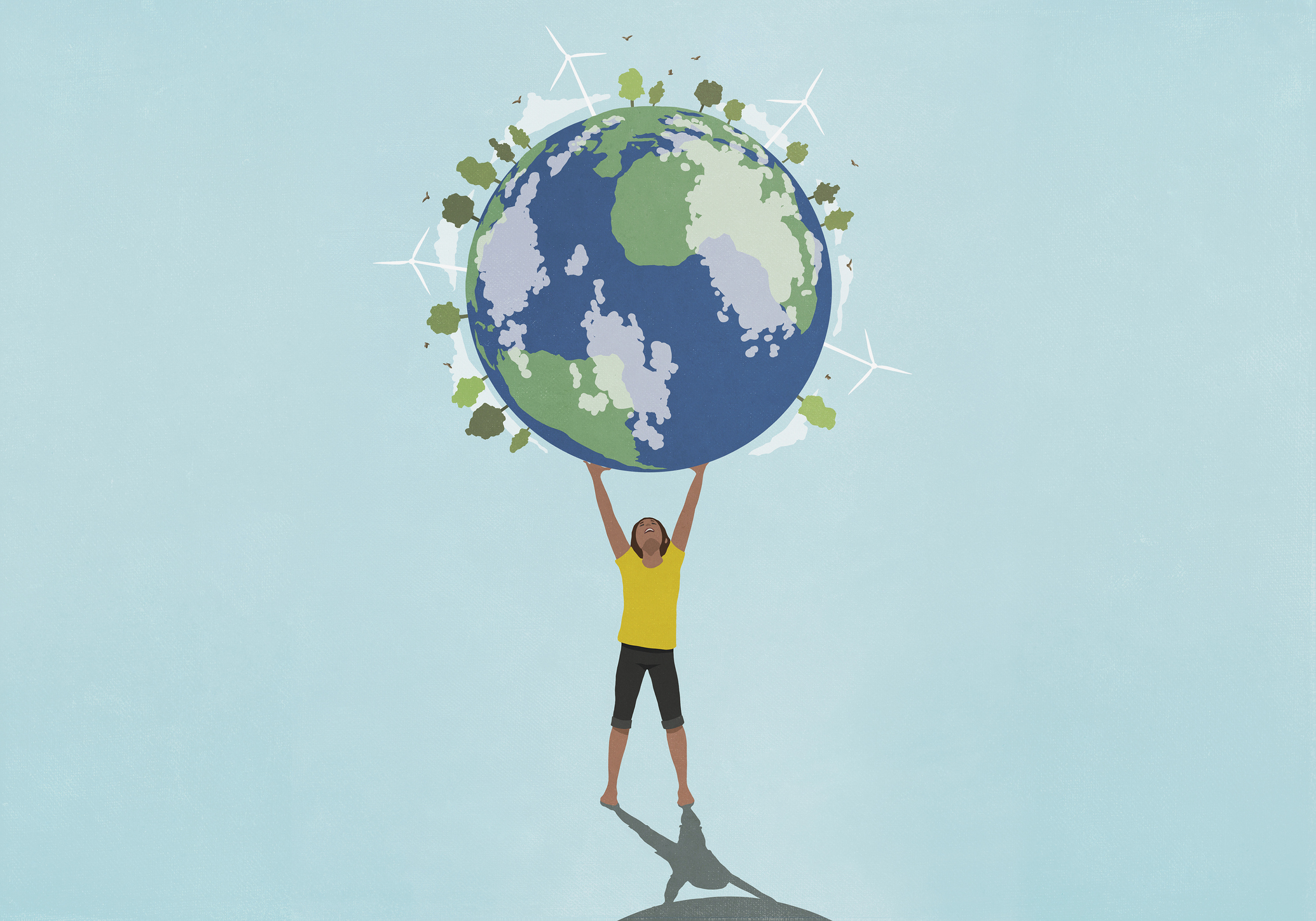How to Make Tough Choices in a Morally Exhausting World

Modern life is morally exhausting. And confusing. Everything we do seems to matter. But simultaneously: nothing we do seems to matter. My friend, an outspoken environmentalist, recently posted to social media a picture of herself on a beautiful beach, celebrating a moment of quiet with nature. And predictably—the internet being what it is—within a few moments of posting it, one of the first comments came in: “How much carbon did you emit to go on your vacation?” The implication, of course, being that she’s a hypocrite, preaching environmentalism for thee, but not for me. And despite the comment seeming like a childish jab, she—like most of us—cares about justifying her actions, and so she responded, citing all of the ways that she minimizes her carbon footprint and arguing that never getting to enjoy her life seems like an unreasonable standard.
This sort of debate plays out in my head, with me playing both sides, regularly—many times a day, if I let it. This morning at breakfast, I poured almond milk on my cereal, which is the result of a judgment I made years ago when I decided that cow milk is too environmentally expensive to justify. In general, animal-based foods have a higher carbon footprint than their plant-based counterparts, and so I have, to varying degrees over the years, reduced or eliminated them from my diet. But while working on a recent food ethics project, I learned that almond milk might not be a great substitute. Although it does have a lower carbon footprint, almond trees require huge amounts of water—like, over three gallons of water to produce a single nut—and more than 80% of the world’s almonds are grown in California, which suffers from severe drought. Switching from cow milk to almond milk thus traded a high carbon footprint for high water use.
I also drove to the gym today, which reflects many ethically relevant decisions I’ve made about my life. I live in the suburbs, which means I have to own a car and drive most places I want to go. Making this choice supports a lifestyle popular in America that is very bad for the environment—one of spread-out individualism, in which so many of us live in big houses, with big, mono-crop lawns, driving our private cars to do every minor task. My drive to the gym or my 45-minute commute to campus is a reminder that I’m part of a radically unsustainable cultural choice.
I do, however, try to minimize the effect of this lifestyle by owning an electric vehicle and driving it rarely. I work from home when I can, and most trips are less than 10 or 15 miles. So I’ve responded to the sense of being implicated in a problematic structure by trying to minimize my participation in it. But I know it’s not a perfect response, and so I feel moderately guilty about my suburban home and my private car.
Even our entertainment decisions are not left untouched by such moralizing. In recent years, there have been extensive debates about the appropriateness of “deplatforming,” or boycotting problematic artists. Should we stop consuming their products? If I stream a stand-up comedy special through Netflix, it’s not likely that an artist (or their financial backers) would notice that I viewed their product, nor would my refusal to watch have any measurable impact on them. But watching does seem to support them in some way, even if they wouldn’t notice, and that support feels morally problematic.
We could continue digging up cases. But the basic context that makes up the confusing ethics of today is the following: many of us feel an individual responsibility to address massive, collective problems, despite an inability to act in ways that have a meaningful impact on those problems. The problems are too big, and my contribution too small, to make a difference. I’m torn between the pull of a kind of purity (that I should keep my hands clean by withdrawing from problematic activities) and a sense of nihilism (that it doesn’t matter what I do, so I should get over myself and just live my life).
So what is each of us to do? How do we live a morally decent life when we can’t even get our arms around the problems? This is where what I call “catastrophe ethics” fits in. While traditional ethics may harbor ambitions for telling us precisely what we are morally required to do (don’t lie, don’t murder, keep your promises), catastrophe ethics aims to answer a slightly different question: what sort of life can you justify in the face of today’s threats?
The psychologist and philosopher Joshua Greene thinks the human brain is like a camera: it has an automatic (fast, easy to use, not very versatile) setting and a manual (slow, effortful, but versatile) setting. Greene thinks that this leads us to make different kinds of judgments in different situations, and that this extends to moral judgments as well. Just like we have fast intuitions about danger (snakes!) and utilize slow deliberation in other situations (how do you determine the volume of a sphere, again?), we have both types of judgments about moral problems. Our automatic moral camera is often in charge, making judgments quickly and unthinkingly, helping us to navigate the world without constantly slowing down and deliberating. And like with its non-moral counterpart, the fast judgments it makes are often correct. I don’t typically need to deliberate about whether to lie or keep my promises, and I never have to wonder about whether I should cause random violence. Our auto setting is helpfully efficient.
To get reliable fast judgments, however, our automatic cameras must be calibrated. Greene tells us we can get such calibration through genetic transmission, cultural transmission, or effortful learning. Genetic transmission likely explains some of our deepest fast judgments (Snake! Danger!), and we learn many of them through cultural absorption as well (Look out! A gun!). But many of our automatic settings were calibrated through personal experience (A stove! Hot!).
But sometimes we find ourselves in a novel situation—one that neither our ancestors nor our culture nor our personal experience has prepared us for—and yet we have a moral intuition about what to do. Should we trust this fast, automatic judgment? Greene says no, because there’s no reason to think it’s gotten the case right.
Many of the moral problems of today are unfamiliar. They are so different from the ones that humans have faced before that we shouldn’t assume our moral cameras have been trained on a reliable set of data. Greene himself notes climate change as a paradigmatic instance of an unfamiliar moral problem, but there are others—catastrophes to which we can make small contributions through simply living our normal lives.
Humans evolved in fairly small groups, where the effects of our actions could largely be witnessed or inferred. The moral rules that humans developed to regulate their actions thus made sense as they responded to the most salient ethical considerations of the world around them. These rules focused on concepts such as harm to individuals or the rights of individuals. Over the past two centuries, however, the scale and complexity of the world has grown almost unimaginably. In the year 1800, there were still fewer than 1 billion people alive, and they were spread around the world, without direct or easy access to one another. Now there are more than 8 billion people, with an information and communications revolution in recent decades that made the world, so much bigger in terms of people, feel so much smaller in terms of reachability.
It is in this context that the question of my individual contribution to catastrophic problems arises. Our ancestors’ morality did not prepare us for climate change. And we as individuals or as a culture have not yet figured out how to respond to the moral demands of problems so grand in scope. The ethical questions raised by massive, structural problems are unfamiliar, and so our intuitions require calibration.
The first step in answering what sort of life to live is to realize is to resist the seductive pulls of both purity and nihilism. A purity ethic commands us to stop contributing to harmful systems; but following that dictate is likely impossible, and certainly unreasonable. Each of us will emit greenhouse gases because consumption is part of living. And we will emit more than we might otherwise because society has made certain choices for us (American society, for instance, is car-centric—a fact that no one of us chose). So it’s both unreasonable to expect that everyone cut their emissions to zero, and it’s unfair, because individuals are trapped within a system that limits their realistic choices.
But this is where the nihilist makes a mistake. From the claim that one is not ethically required to withdraw from all bad structures, they move to the claim that nothing one does matters. But this doesn’t follow. While it’s not plausible that I’m obligated to keep my hands clean, it is good when I reduce my participation in bad systems and positively contribute—even if in minor ways.
That means that, in a world where nearly everything we do implicates us in various systems and structures, there are a lot of opportunities to participate in good and bad, and so a lot of careful reasoning to do. The bad news is that this can feel overwhelming: everything we do seems to matter. But the good news is that we get to matter. The moral work is constant and creative, as we need to (get to!) decide constantly how to structure our lives so as to respond to the threats around us.
Of course, not all ways of organizing one’s life are morally equal. There are all sorts of strategies for responding to catastrophe, and the real work begins when each of us steps back and takes the time to identify how we can contribute to the many moral projects available. The question here is: how do I fit in? With my interests, talents, and privileges, where can I best serve? That means that there is no single right way to fight climate change, or any other major problem for that matter. Rather, there are various justifiable lives for each of us.
Choosing one of these lives is not about moral purity. And it avoids nihilism. What it allows is an ethic of conscientiousness.
This is an adapted excerpt from Catastrophe Ethics by Travis Rieder, published by Dutton, an imprint of Penguin Publishing Group, a division of Penguin Random House, LLC. Copyright (c) 2024 by Travis Rieder.
MORE MUST-READS FROM TIME
- The Fight to Free Evan Gershkovich
- Inside the White House Program to Share America's Secrets
- Meet the 2024 Women of the Year
- Breaker Sunny Choi Is Heading to Paris
- Long COVID Doesn’t Always Look Like You Think It Does
- Column: The New Antisemitism
- The 13 Best New Books to Read in March
- Want Weekly Recs on What to Watch, Read, and More? Sign Up for Worth Your Time
CONTACT US AT LETTERS@TIME.COM




No comments:
Post a Comment